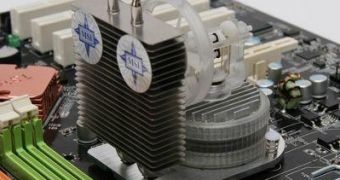MSI is about to demonstrate at this year's CeBIT show world's first Powerless Air Cooler on a motherboard. The ECOlution is more than an average trademark, and MSI intends to dedicate most of the products showcased during the CeBIT expo.
The energy-less fan solution is based on the Sterling Engine Theory that transforms the thermal energy of the underlying chipset into kinetic energy that will provide the chipset fan with the necessary energy. Therefore, the fan will be powered by the movement of heat and air, and the fan's speed will vary depending on the chipset's temperature. The new prototype has been suggestively named "Air Power Cooler" and is the company's first shot at developing a viable solution for the "ECOlution" motherboard.
The cooling system is based on Robert Stirling's 19th century "Heat Economizer," and it relies on the fact that the hot air from the chipset expands and rotates the fan blades, that subsequently cool down the vertically-aligned heatsink. When the heatsink is cool enough, the process stops, as there is no heat to power up the fan blades.
The whole system is powered by a central piston, and when the air moves, it will apply pressure and move the piston down. The company worked closely with heat transfer specialist Polo-Tech in Taiwan during the development of the innovative system. According to company officials, the piston can "transfer over 70 per cent heat power to air power."
The concept is more of a proof of concept than of a practical approach, given the fact that it is neither the hottest, nor the most power-hungry part in the computer. If the company managed to port the project to say, the central processor, it would have been quite a breakthrough. However, it seems to be a solid starting point for future developments. The company claimed that its engineers are going to "try to turn this early concept into mass production in the near future."

 14 DAY TRIAL //
14 DAY TRIAL //